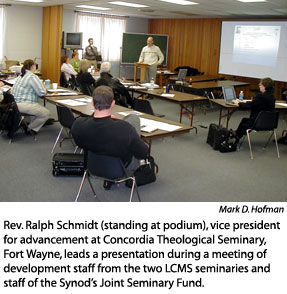In their first meeting in at least 10 years, development teams from the Synod’s two seminaries got together with staff from the LCMS Joint Seminary Fund to get to know one another, share strategie s, and discuss ways they can work together to benefit seminary education in the years ahead.
s, and discuss ways they can work together to benefit seminary education in the years ahead.
The meeting, held Dec. 20 at Immanuel Evangelical Lutheran Church in Terre Haute, Ind., was “significant in accomplishing the goal of strengthening the unity and harmony and concord of the seminaries as they provide pastoral education for our beloved Lutheran Church–Missouri Synod,” said Dr. L. Dean Hempelmann, executive director of the Synod’s Board for Pastoral Education, which administers the Joint Seminary Fund through the LCMS Foundation.
The fund solicits donor contributions and bequests to fund the theological education of future pastors, chaplains, missionaries, deaconesses, and other church workers at both seminaries. Since May 2005 it has received gifts from 1,100 new donors, according to Jeff Craig-Meyer, vice president of the Joint Seminary Fund. And direct gifts to the fund are up by 30 percent, he said.
Craig-Meyer said he believes the meeting paved the way for even better seminary funding — and perhaps more pastors — in the years ahead.
“When you put the two seminaries and the Joint Seminary Fund together, it just makes all of us stronger toward the cause of seminary education,” he said.
“That leads to reaching more people with the message for purposes of raising money, but it also, I think, will get more people excited about the idea of studying to become a pastor.” And recruiting pastors is “critical,” he said, for the future of the Synod.
Hempelmann said he is convinced that the Synod’s seminaries “can be one of the great healing and strengthening forces” in the church body. “Surely the seminaries are one of the most unifying points of the church in its daily life,” he said, so seeing them work together toward a common goal is “a beacon of light” for the Synod.
Sheryl Ray, development coordinator for the Joint Seminary Fund, said the meeting helped participants realize “that we’re not in competition for the donors’ dollars, that we are actually working collaboratively as a team” to benefit LCMS seminary education as a whole.
That sentiment was echoed by Mark D. Hofman, vice president for development at Concordia Seminary, St. Louis. “Making a commitment to spend time with our counterparts at our sister seminary and the Joint Seminary Fund staff, I hope, demonstrated our willingness to seek ways to help and support each other,” Hofman told Reporter.
The meeting was important, he said, “because it gave our staff the opportunity to get to know the Joint Seminary and Concordia Theological Seminary, Fort Wayne, staff members better, and to see that we’re not all that different. We have similar roles. We share many challenges.”
In development work, Hofman said, “good relationships are everything.”
As a result of the meeting, Hofman says his staff now has “a better understanding of how the Joint Seminary Fund supports LCMS theological education, as well as an appreciation for the challenges that the Joint Seminary staff and the staff at our sister seminary face.
“For me, the seminaries will benefit because we can talk openly about ways to improve our services and our programs to meet the needs of donors and the institutions we represent. And I hope that seminarians will benefit through growing levels of financial support and participation by people in the church.”
For more information about the Joint Seminary Fund, contact Craig-Meyer toll-free at (888) 930-4438 or jeff.craigmeyer@lfnd.org. Or visit the Joint Seminary Fund Web site.
Posted Jan. 26, 2006




